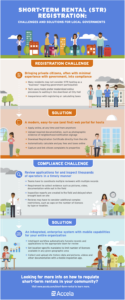“Ensuring short-term rentals enhance the community”
“Lawmakers consider changes to short-term rental regulations”
Headlines like these flood news outlets in cities across the country as the short-term rental (STR) market expands. In 2022, U.S. STRs earned over $62 billion—that’s more than a 25% increase over the previous year!
The development of the sharing economy benefits cities by contributing to post-COVID growth and providing additional revenue. However, it also puts an added onus on government agencies to ensure STRs add to the quality of life for neighborhoods and stay ahead of changing compliance regulations.
Local government agencies that choose to regulate STRs can meet these demands and provide a service to their community by:
- Simplifying registration for hosts and increasing revenue
- Reducing processing times with automation
- Improving effectiveness in the field
- Enhancing compliance and enforcement
Let’s start with providing easier registration.
By enabling an online registration process, agencies eliminate the barriers to host registration and achieve higher registration compliance.
Since most STR hosts find themselves running a small business for the first time, assistance is crucial. STR registration software provides clear instructions on how to become a licensed host and information on codes. To start, hosts can apply for their business license and register as a host for their STR rental from the citizen portal, and also take care of renewals and amendments to their applications, ensuring proper revenues to the agency.
Next up, improving speed with automation.
An online registration process saves staff members’ time and reduces wait times. Switching from a manual process to automation decreases turnaround times and empowers agencies to provide a positive experience for hosts, making them more likely to remain compliant.
Agencies can also proactively notify hosts of application statuses, providing a better customer experience and reducing the number of inquiries for staff to respond to.
What about improving effectiveness in the field?
However, compliance isn’t a one-time occurrence. Effective software can deliver full access to the GIS database and record information on a mobile device, providing inspectors with increased efficiency when visiting rental properties.
Finally, let’s discuss enhancing compliance and enforcement.
Compliance and enforcement are enhanced in Accela’s STR software, with easy-to-submit infraction reports, simplified complaint submission for residents and a more positive experience to help property hosts take enforcement actions and achieve compliance.
Agency staff can run reports on STR registrants by date, status, and balance due. Citizens can also run reports on STRs in their area by location or owner and verify active licenses.
Most importantly, it’s all about service. Government agencies also want to provide an exceptional experience for their residents. According to McKinsey, improving customer experience can also yield significant value for U.S. state governments and their constituents. In fact, McKinsey’s data also shows government agencies that improve customer satisfaction can also:
- Increase trust in the government
- Lower the cost of service
- Improve civic engagement
The STR market is growing at a fast pace across the country, and government agencies must keep up. How will they meet the demands of residents and visitors alike? How will they ensure they capture lost license and tax revenue? How can they increase compliance?
Only time and technology will tell.
—
Looking for a better way to maintain oversight of short-term rentals in your community? Accela’s Short-Term Rental Application provides government agencies with a solution that allows hosts to register easily, governments to issue licenses quickly and tax revenue to be captured efficiently. Learn more.




